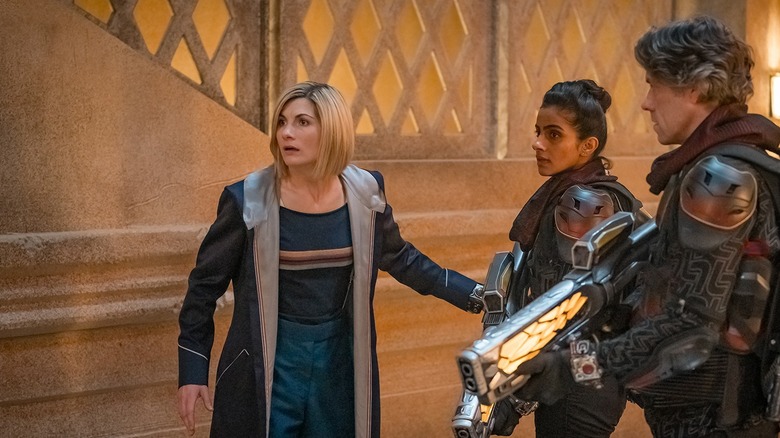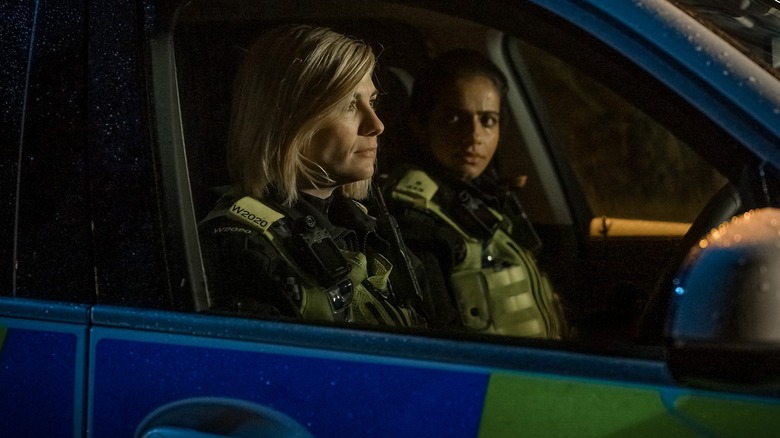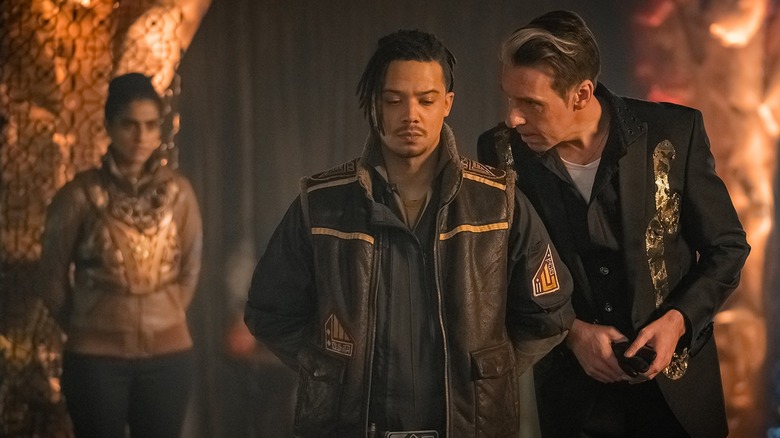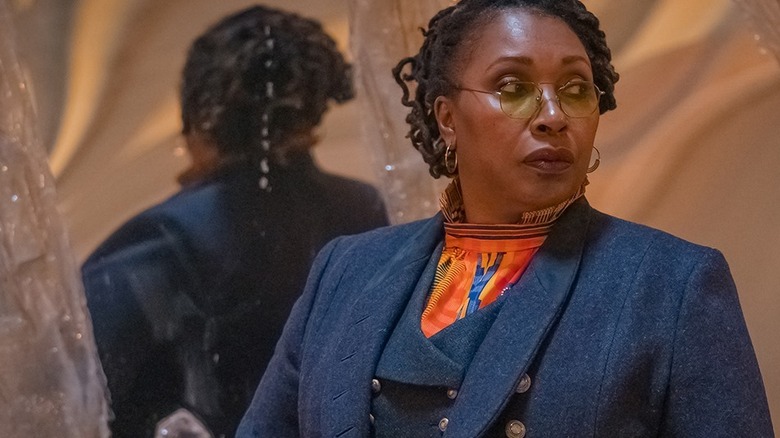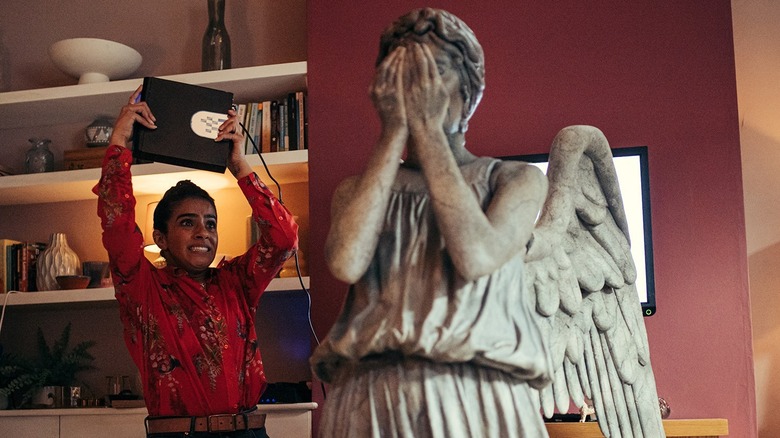Doctor Who: Flux Trips Up And Gets Trippy For Once, Upon A Time
For a show about time travel, I've sometimes thought that "Doctor Who" didn't get weird enough. Not weird in the way of kitchen-sink sci-fi that the show has become famous for — where else would you get a show where cat nuns experiment on diseased clones? — but weird in the way of playing with format and form. "Doctor Who" has done this a handful of times before, primarily in episodes written by the divisive former showrunner Steven Moffat, but for the most part it's settled in its place as a family show that reaches a wide, cross-generational audience.
Which is probably why "Once, Upon a Time," the time-hopping third chapter of "Doctor Who: Flux," is so alienating to both casual and die-hard fans alike. It's Chris Chibnall taking a leaf out of Steven Moffat's book and engaging in that good old timey wimey mystery box storytelling. But Chibnall is no Moffat, and the results are a lot more mixed than when Moffat is at his best (your "Blink's" and "Heaven Sent's") and more along the lines of a middling-to-bad Moffat-inspired episode. Still, it's refreshing to see Chibnall cribbing a style that isn't Russell T. Davies' for once, and trying his hand at something more experimental, more ambitious, and more interesting, even if it's uneven.
Still, there are little gems to be found in this highly ambitious backstory-heavy episode of this series, though they might be buried under a lot of confused plotting and Chibnall's old favorite, exposition. And while Chibnall opens the mystery box only to reveal it to be full of Russian dolls of even more questions, "Once, Upon a Time" is by far the most experimental and interesting hour his era of "Doctor Who" thus far — well, apart from the time they introduced a sentient universe shaped like a frog.
Into the Time Storm
I've got to hand it to "Doctor Who" — whose cliffhangers are often resolved by "the Doctor waves the sonic screwdriver!" — they didn't flub the solution to last episode's nail-biter. In a rare bit of insight into the Doctor's mind (have we ever heard them narrate their thoughts?) the Doctor weighs everything happening in front of her, and a million solutions to save her friends, as Swarm prepares to snap his fingers and kill Yaz in slow motion. There's only one thing she can do, and it's the most dangerous: she throws herself and Dan into the middle of the Time Storm. What is the Time Storm? Don't ask me! But it appears to be an incorporeal plane made of purple CGI where the Doctor, Dan, Yaz, and Vinder, along with an errant Weeping Angel, hang in suspension until they all suddenly fizz away — the Doctor last, screaming at the universe to slow down.
But slow down this episode does not, as the Doctor is dropped in the middle of another person's story. She's surrounded by Dan, Yaz, and Vinder, but they're not acting themselves, and neither is she — but she snaps out of her "temporal hazing," and the team prepare to storm the temple of Atropos and save the universe, again. Or maybe it was before?
But before we can get our head around what's happening with the Doctor, "Flux" switches things up again — and several times over. "Flux" has already been starting to creak under the weight of its many, many storylines, but "Once, Upon a Time" introduces one more: that of Bel, a spunky survivor of the Flux who traverses the ruined worlds destroyed by the planet-eating phenomenon and narrates her woes to her lover. Thankfully, as played by the lovely Thaddea Graham, she's eminently likable — deftly navigating worlds overrun by armies of Daleks and Cybermen, while chatting with a Tamogatchi-like device she calls "Tigmi" and delivering rousing speeches about the power of love to a dying Cyberman. She takes an unusually large part of the episode for a character whose rather thin connection is only revealed at the very end — she's the starcrossed lover of Vinder (Jacob Anderson), whom we also only just met two episodes ago, and she's carrying Vinder's child. Still, despite the surprising amount of screentime that Bel gets, she's never a chore to watch and her scenes add rich pieces of world-building to the episode, even if she's just one of the many parts of the episode that raises more answers.
Time is Playing Games With You All
Meanwhile, Dan and Yaz have been dropped in their own timestreams, but something's off. Dan finally shows up on time for a date with Diane (Nadia Albina), but he blinks and day has turned to night, and they've moved from the museum steps to some mysterious ruins. He sees blue swarms of particles floating above them and gets lost in thought — shouldn't he be somewhere else? Finally Diane clues him in, "I was waiting, you didn't come," she says before disappearing into smoke. Out of the smoke, the silent Passenger appears and Dan sees a vision of the Doctor, appearing as a hologram and urging him to stay put. But it's as if the world keeps moving around him — Dan is dropped in the middle of tunnels where he and a laser-gun Joseph Williamson (still wearing his 1800s garb) are chased by monsters.
Yaz seems to be back in her old life too, but it's not as she remembers. She at first thinks the Doctor is her police partner, rambling on about food and clothes, before that illusion phases out and it's just another woman. She's playing video games with her sister, but she doesn't remember it like this. And all through this, it's as if she's being stalked by a stone statue, appearing in her car mirrors and then the video game. Suddenly — a vision of the Doctor as well, speaking urgently to Yaz and warning her that something is blocking her from her time stream.
Vinder has the most straightforward experience, reliving his memories of getting rewarded for valor with a posting guarding the elite Grand Serpent (a flamboyantly slimy Craig Parkinson), whom he discovers is nothing more than a corrupt crime boss trading with refugees' lives. But Vinder starts to clue in early on that he's reliving his worst memory — when he witnesses the Grand Serpant blackmail diplomats and decides to blow the whistle, resulting in him getting banished to the far-off outpost we first meet him at. He begs, "Don't let me relive this," but he does anyway — to our benefit, as we get further glimpses into this rich, high fantasy-tinged world he hails from. These brief snapshots of Vinder and Bel's stories do feel like "Doctor Who" taking cues from the modern "Game of Thrones" and "Foundation" landscape of TV rather than the Douglas Adams-inspired hodgepodge we had before, and it's extremely compelling.
A Fugitive Memory
But whereas Dan and Yaz's trippy storylines are more for the uneasy atmosphere and Vinder's is for the backstory, the Doctor's story is where we get the most intriguing plot. As the episode unfolds, we learn that the Doctor has not been dropped in someone else's memory — she's been dropped in her own, that she had forgotten. Jo Martin is back as the Fugitive Doctor, but only in reflections, which is where the two Doctor see each other and the Doctor realizes what has happened.
This is a memory from when the Fugitive Doctor worked for the Division, crossing paths with Swarm and Azure the first time around. Seeing Jodie Whittaker play the Fugitive Doctor is fun — there's a hard-nosed, no-nonsense quality to her that we've never seen the Thirteenth Doctor have, and it's refreshing. Of course, it's this memory that helps the Doctor figure out how to defeat the Ravagers in her present time: she witnesses the Fugitive Doctor, with her three similarly rugged fellow soldiers (whose faces we never see, as they're played by Mandip Gill, John Bishop, and Jacob Anderson, all having a blast), bargain with the Ravagers and reveal her ace in the hole: inside one of their Passengers, which are actually living prisons full of millions of life forms, are the Mouri, who take control of the Temple of Atropos from Swarm and Azure (who drone on about all kinds of villain things like "reign in hell" and a "battle between Time and Space"), and put time back in its place. The Doctor uses this knowledge to plead to the giant Mouri inside the Time Storm to replace the three destroyed ones and save her friends — and they do. But not before the Doctor, attempting to learn more about her past, is knocked into another location, with a mysterious elderly woman named Barbara Flynn, who scolds the Doctor for fighting for a lost cause. "This universe is over," she tells the Doctor, matter-of-fact. The Flux was created by them, "because of you."
So many questions and not enough answers! But "Once, Upon a Time," as messy as it is in pacing and plotting, has enough in vibes to keep me interested — and at least to keep me admiring its ambition. We end the episode with Vinder getting dropped off on his devastated home planet to look for his lover Bel, and the Doctor, Dan, and Yaz head off to ... somewhere. But they don't have time to contemplate their destination when Yaz takes out her phone and finds a Weeping Angel in it. The image of an Angel becomes an Angel, after all, and now ... the Angels have the phone box. Someone get that on a T-shirt.
Tidbits in Time and Space
- The CGI in this season has been very spotty. You have gorgeous aerial views of planets destroyed by the Flux, beautiful shots of alien planets covered in lush red grass ... then there's the glorified After Effects VFX of the blue time force particles, or "time mites." It's almost as stark a difference as that between the ugly acid lake and the stunning devastation of the Flux from the first episode.
- It's extremely funny to me that Dan has gone from being kidnapped by a space dog, dropped off in Crimea, teleported to a dystopian version of his home all in one evening. And then he spent the rest of it hallucinating. Poor guy.
- John Bishop playing Memory Karvanista is also very fun, and a brief but small showcase for the comedian's acting chops — it's clear that Dan is not very far off from the actor's real-life personality.
- On another note: Dan (left at the altar!) and Vinder (exiled whistleblower!) got more backstory and characterization in this episode than Yaz has had in two seasons. And Yaz still feels like she's behind.
- The continued fraying of the relationship between the Doctor and Yaz is good, especially when the Doctor uncharacteristically snaps at her toward the end. Hopefully it's enough to build to whatever arc they've got going for Yaz.
